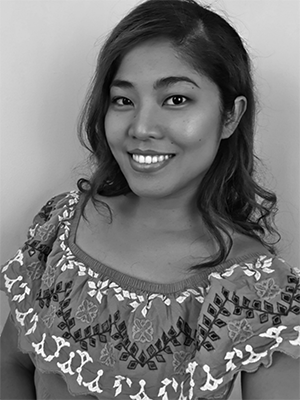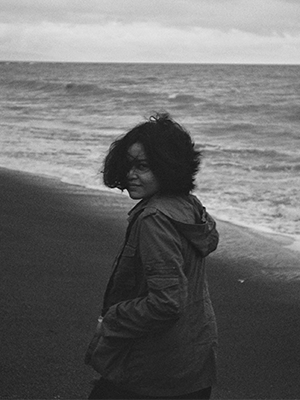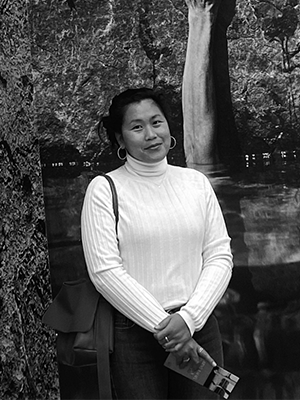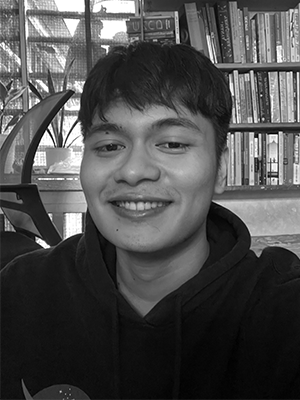Foundation Day
Our history pried open by men cassocked, white, sweaty
and our daughter, days-dead, returned to us
as herself: as this story made us for them
true, we lay it into cobblestone and mortar.
When the quake spared only the belfry
we rebuilt in each other the story instead:
this town was founded on good. Told by the great story
to endure with no end goodness
we wound around the streets the marble and gilt
blessing of the child savior, we dressed
the patron saint of disappointing progeny
in a robe worth more than our bodies
our devotion made us name our streets after
the story’s authors and favorite virtues.
Our days they say were slow and irreparable
a fact of the town never escaping its fate as town.
When our pink-faced masters severed the heathen
hands of our rebel, who while uttering a war cry
raised the bishop’s staff, the story appeased us
into shame, our shame cracking into malice
mildewed church pews of too many storms, his screams
of agony giving us our wrath—our wrath a fact we own
a pact through which we could
retrieve ourselves. Intimately we know who we are
to our enemy, and so hide every truer version of us
in us. Because our story is their dire parable
our birth is a lesson we keep sinning into
and out of. Because withheld from us is
their salvation, to this day we’d people their church:
though we vowed, once, to repay them their share
of our dead—sepulchral town, the light
invading our windows is cobwebbed light
the air is musty and gathers about our feet
like dust—we will carry our history the way time wears out
our grudges, time will have us
forget which hatreds to celebrate, whom
outside ourselves to hate:
Dramaticule: The Townsfolk
THE OLD PROPHET, takes on the appearance of the first prophet of the dead century.
CHORUS, of varying ages, clothes suggesting an imperviousness to excess.
CURTAIN
CHORAGOS
Sometimes we take a tricycle around town just to be able to do something. From end to end, the town is twenty-seven minutes. We get to plots of land, emptied of crops in the summer, then we get to the sea. Within the borders of our safety the humid evening settles, punctual and laden with the same claims.
CHORUS
We believe we shall see the good things of the lord in the land of the living.
CHORAGOS
The birthplace of the dictator is farther north. This is no longer the port through which gold is trafficked. We grow our tobacco, so does every other town near us. A cinema right in the middle of town. When we lie we are optimistic. Rocking back and forth between one month and the next is a good movie in which things happen. In the movie, the faithful see an eclipse. This means everything. We’ve had our share of eclipses, two this decade. But that’s how far we can make our lives worth more than what they are. We don’t hate ourselves; those who don’t particularly think of us we envy.
CHORUS 1
We believe we shall see the good things of the lord in the land of the living.
CHORUS 2
We are bored but believe we shall see the good things of the lord in the land of the bored.
CHORAGOS
Meanwhile we’ve been clearing our throats, we cover our napes with towels, covet our neighbors’ spouses, at some point begin to overlook the sky turning orange and indigo at sunset, meddle in our children’s intramurals. Our children every night peep into the only house with a color television. Throughout the day we gnaw at random things about one another, among ourselves we talk. Though we say we forget—
CHORUS 1
We believe we shall see the good things of the lord in the land of the living.
CHORUS 2
We are bored but believe we shall see the good things of the lord in the land of the bored.
CHORAGOS
We remember, we tally sins against us. The problem is history, measured in grand events: the only other way we know time as, apart from the unendurable everyday. We look at one another and the stories we share are those we can’t transcend. Must our happiness depend on how keenly we imagine what isn’t made known to us? We don’t and can say we’ve been happy.
CHORUS 1
We believe we shall see the good things of the lord in the land of the living.
CHORUS 2
We are bored but believe we shall see the good things of the lord in the land of the bored.
CHORAGOS
We were teenagers who would stay at the plaza, risking curfew, devising schemes to overthrow the government. Because desires rarely define our choices, versions of us have gotten married, worked the land, raised teenagers who in secret thrived on disavowing us, what we stood for. The lucky ones work abroad and now have cement houses with a second floor.
CHORUS
We are bored but believe we shall bore the bored things of the lord in the boredom of the bored.
CHORAGOS
We want a future, we wish for tools to measure it better. We invent names for the various blights on tobacco leaves to pass the decades, according to degrees of brownness and horror. Mornings when we wash our faces free of our own skin, we’re still our skin.
CHORUS
We are bored but bored we shall bore the bored things of the bored lord in the boredom of the bored.
CURTAIN
STAGE
Tent lit with a fluorescent lamp. A casket in the middle, the foreign anthropologist as THE OLD PROPHET inside, white anthuriums donated by barangay officials. Or the old prophet can be THE OLD PROPHET. Or someone we’ve all heard of who deserves it.
CHORAGOS
Nondescript, gaze averted from the audience throughout the entire performance, given that it’s not their job just yet to perform for you, though you can tell who they are, those most attentive to the speeches of the dead.
CHORUS
Everyone in town except those to whom the statements of the CHORAGOS do not apply. Divides into two uneven groups at some point in the dramaticule. Once the CHORUS is reunited toward the end, they begin to talk over the CHORAGOS and repeat their line without interruption.
TOWN
Nearly resembling this town is a dramaticule town.
EVENING
You feel it deepening by the sound of crickets, motorcycles revving in the distance.
A Wall of Trees Conceals Our Town from Another
Despite night with its unsecret riots, any one of us opening a door
means it’s the same morning. Calves already grazing on lots
beside our unnumbered houses. Dirt roads away, waves
not yet wild-hooved. All elements tug us down into place.
Morning with its flat honesties. Methodical
as someone whose life is beyond repair, morning bridles
evening’s dreams, tethers the obedient human, their trained canter.
The world’s troubles at once unimaginable and irrevocably
here. Eldest daughter told not to sweep the floor
youngest siblings dunking funeral biscuits into coffee.
We shuffle closer to the casket, and the face we see is
the face we wear every morning. Among ourselves we are
not unknowable, not irreplaceable, our plot assailable
and weed-choked. Idle minutes while waiting for the priest
someone cracking a joke at the expense of our time left
on earth. The insistent rhymes of our language, the stutter
of a palsied mother. Though we’ve obeyed, we obey
and scheme, our schemes borrowed from news of cousins abroad
claims about our gods. Meanwhile: harvest, fish to dry, our teachers
walking to school, mornings of Nutribun. Some months
fields pillaged by winds, our mammals sequestered by the sea.
God taketh. We hunger and make do. God taketh.
Spindly limbs of summer trees, nothing more erratic than clouds
nights with our rolled cigarettes. We power through tragedies
through ballads, tragedies are our tells. We anticipate
the envy-haze static of television, the riskless terrors of AM radio.
Thwacks of sex, blanket muting our torsos, sweat, beside us our children
dormant, we’ve gentled other urges. We continue our lives as if
soles of our feet rot-cracked and thick as years, they’re the life
we should’ve lived, perfectly, our town’s made of how we give.
*
Author's Note
These poems belong to a sequence tethered to the alleged Marian apparitions which occurred in the town of Agoo, La Union in 1993, as witnessed by Judiel Angelle Nieva, a trans woman. The project is preoccupied with forming a simulacrum of the aggregated consciousness of the town: the poems, assuming various forms, display the evolution and diffusion of the plural first-person pronoun, morphing based on provisional instances of solidarity born of oppression and belief, class resentment, and a keen investment and sense of complicity in the entire devotional extravaganza. All three poems contain passages from Florent Joseph Sals’s The History of Agoo. Grateful acknowledgments too to the following authors, whose works I drew from: H. Otley Beyer; Emma Helen Blair and James Alexander Robertson; Edmond Jabès, translated by Rosmarie Waldrop; and Shaun Prescott.













